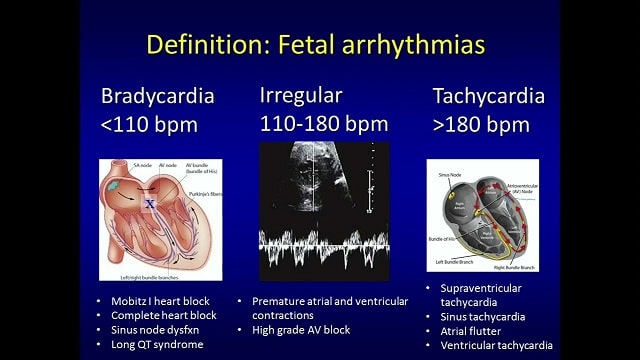Fetal arrhythmia is a condition where there is an abnormality in the fetal heartbeat in the womb. This condition can include an increased heart rate (tachycardia), a slow heart rate (bradycardia), or an irregular heartbeat. A normal fetal heart rate is in the range of 120-160 beats per minute.
This disorder is quite rare to experience, occurring in only about one to two percent of all pregnancies. This condition is also temporary and is unlikely to cause anything dangerous. However, on very rare occasions, fetal arrhythmia can cause death.
Symptoms of Fetal Arrhythmia
Your doctor may detect a fetal heartbeat that is too fast, too slow, or irregular during a routine pregnancy exam, such as an ultrasound. If this is true, further testing may be needed to confirm it.
Causes of Fetal Arrhythmia
Doctors do not always know the causes of this irregular fetal heartbeat. However, there are several causes, including:
- A disturbance in the electrical signals in the heart.
- Structural abnormalities in the liver.
- Congenital heart defects.
- Experiencing ischemia, or restriction of blood flow to the heart.
- Electrolyte imbalance.
Risk Factors for Fetal Arrhythmia
Fetal arrhythmia is indeed a risk during pregnancy, but the possibility is relatively small. There are several risks that can increase this disorder, namely:
- Having certain autoantibodies found in autoimmune diseases, such as lupus.
- Having phenylketonuria.
- Having diabetes before pregnancy or developing gestational diabetes.
- Have had fetal heart block in a previous pregnancy.
- Taking certain medications, such as teratogenic drugs.
- Having an infection in the first trimester, such as rubella.
- Having a fetal abnormality detected during ultrasound.
- Getting pregnant through in vitro fertilization.
- Pregnant with monochorionic twins.
Diagnosis of Fetal Arrhythmia
If the doctor suspects that the baby in the womb is experiencing arrhythmia, a more detailed examination needs to be done, namely with a fetal echocardiogram. The device used can help visualize the structure of the heart, blood flow, and others to confirm it.
However, this action can only be done at the earliest when the pregnancy is 12 weeks old. If you want to get more significant results, the examination needs to be done when entering the 17th or 18th week.
Fetal Arrhythmia Complications
Babies diagnosed with arrhythmia may have heart defects throughout their lives. There is even a small chance that the fetus will die in the womb or during delivery.
Fetal Arrhythmia Treatment
Each case of fetal arrhythmia can be different from each other in terms of its treatment, and not all of these conditions require treatment. Some cases can even heal on their own.
Doctors can prescribe treatment based on the cause, the health of the pregnant woman, the health of the fetus, and the length of the pregnancy. Medication is the most common way to treat arrhythmia in the fetus. When medication is taken, its contents can pass through the placenta to the baby before birth.
Some drugs that are usually prescribed by doctors include:
- Digoxin
- Sotalol
- Flecainide
- Amiodarone
- Some types of steroids
After delivery, the doctor will monitor the baby’s heart rate. Even recommendations for further treatment may be made.
Prevention of Fetal Arrhythmia
The preventive measures for this condition are still unknown so far.
When to See a Doctor?
In essence, every pregnant woman needs to get regular check-ups. Most likely problems with the fetus, including arrhythmia, can be detected. Because it is difficult to feel the fetal heartbeat without an examination from an expert.

